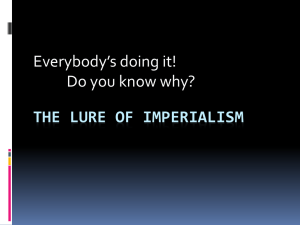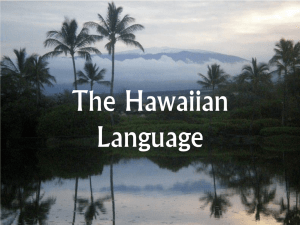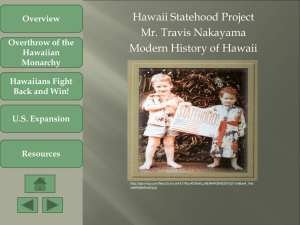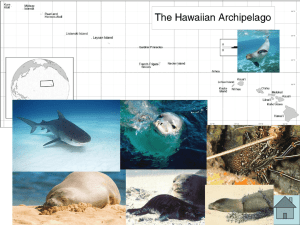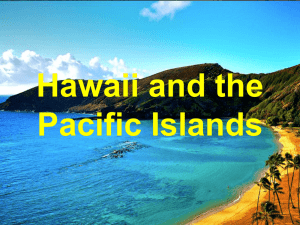Biography and Resume - Ikaika Anderson for Congress
advertisement
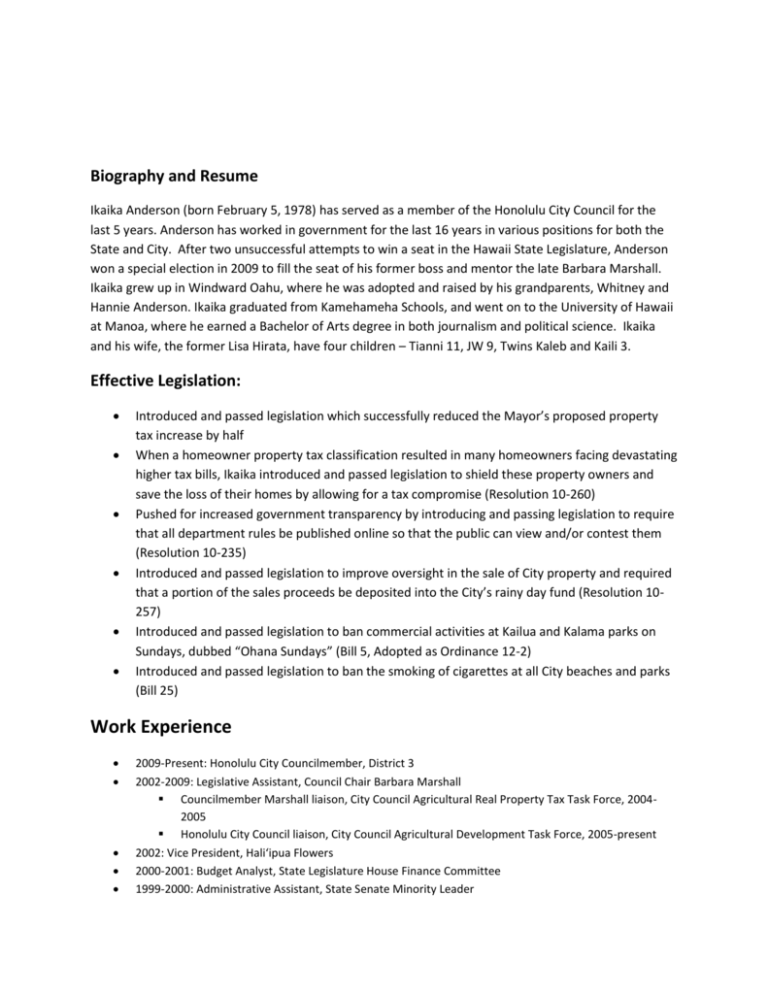
Biography and Resume Ikaika Anderson (born February 5, 1978) has served as a member of the Honolulu City Council for the last 5 years. Anderson has worked in government for the last 16 years in various positions for both the State and City. After two unsuccessful attempts to win a seat in the Hawaii State Legislature, Anderson won a special election in 2009 to fill the seat of his former boss and mentor the late Barbara Marshall. Ikaika grew up in Windward Oahu, where he was adopted and raised by his grandparents, Whitney and Hannie Anderson. Ikaika graduated from Kamehameha Schools, and went on to the University of Hawaii at Manoa, where he earned a Bachelor of Arts degree in both journalism and political science. Ikaika and his wife, the former Lisa Hirata, have four children – Tianni 11, JW 9, Twins Kaleb and Kaili 3. Effective Legislation: Introduced and passed legislation which successfully reduced the Mayor’s proposed property tax increase by half When a homeowner property tax classification resulted in many homeowners facing devastating higher tax bills, Ikaika introduced and passed legislation to shield these property owners and save the loss of their homes by allowing for a tax compromise (Resolution 10-260) Pushed for increased government transparency by introducing and passing legislation to require that all department rules be published online so that the public can view and/or contest them (Resolution 10-235) Introduced and passed legislation to improve oversight in the sale of City property and required that a portion of the sales proceeds be deposited into the City’s rainy day fund (Resolution 10257) Introduced and passed legislation to ban commercial activities at Kailua and Kalama parks on Sundays, dubbed “Ohana Sundays” (Bill 5, Adopted as Ordinance 12-2) Introduced and passed legislation to ban the smoking of cigarettes at all City beaches and parks (Bill 25) Work Experience 2009-Present: Honolulu City Councilmember, District 3 2002-2009: Legislative Assistant, Council Chair Barbara Marshall Councilmember Marshall liaison, City Council Agricultural Real Property Tax Task Force, 20042005 Honolulu City Council liaison, City Council Agricultural Development Task Force, 2005-present 2002: Vice President, Hali‘ipua Flowers 2000-2001: Budget Analyst, State Legislature House Finance Committee 1999-2000: Administrative Assistant, State Senate Minority Leader 1998: Researcher, State Senate Minority Office 1997: Assistant Committee Clerk, State Legislature House Judiciary Committee Community Work and Associations: Waimanalo Hawaiian Civic Club Outrigger Canoe Club University of Hawaii Alumni Association Kamehameha Alumni Association Education: Bachelor of Arts in Journalism, University of Hawaii at Manoa Bachelor of Arts in Political Science, University of Hawaii at Manoa Kamehameha Schools What is your background/experience in the Native Hawaiian community and/or activities. 1. I have been a public servant for the last 16 years, 5 of those as the Vice Chair of the Honolulu City Council. In the State of Hawaii, every policy considered at every level of government has a Hawaiian affairs aspect. While many may not view their policy making through this lens, I must. The very source and identity of Hawaii, of what it means to be Hawaii is intertwined with the vibrancy of the Hawaiian culture and the Hawaiian people. What is your history of public service and advocacy? Include a summary of any legislation you have introduced pertaining to Native Hawaiian issues; and/or activities in which you were involved and advocated support for Native Hawaiian issues, including culture, education, housing, governance, social services, environment, etc. 2. While serving on the City Council, I championed many policy issues. Of most significance to Native Hawaiians were affordable housing, shoreline access, fighting commercial activity on public beaches, and support of millions of grant-in-aid funds, many of those dollars going to Native Hawaiian programs and organizations. In regards to funding the Office of Hawaiian Affairs, the Department of Hawaiian Home Lands, and the ‘Aha Moku Advisory Committee, to what extent do you feel the State should appropriate funds to those offices? 3. If one believes and supports the state constitution, then one must support funding to OHA and DHHL each are specifically described in our constitution. The framers clearly connected the health and wealth of the state to the health and well-being of Native Hawaiians. No question as a state, as a collective body of policy makers, we have missed the mark in this, and must do better, not only in making sure we meet the financial obligation we all have as citizens of Hawaii to Hawaiians, but perhaps more important than funding, is to educate our policy colleagues and our citizenry on the vital relationship with Hawaiians and the absolute connection to the prosperity of Hawaii. We must invest in that which makes Hawaii stronger and prosperous - we can never truly prosper as a state, without the health of our state's Native culture and population. And finally, as leaders, we must reject any resentment that some may display. Hawaii's very economy, the wealth made, its very existence was only possible through the taking of lands that belonged to the Hawaiian people. Every acre held by the state or by the federal government, came from our Native people. There is nothing to resent and everything to gain if we embrace the interconnection we all have in this state to the successes and challenges in the Hawaiian community. What are your views about Hawaiian self-governance. In your capacity as a legislator, what action, if any, would you advocate in support of Hawaiian self-governance? 4. Self-governance is an absolute solution to the goals of any state that has been built upon its native population. Study after study has shown the ill-fated policies of paternalism, and the growth and prosperity that result in Native self-governance. Besides being a basic right under the United States Constitution, it is just plain good policy. Time and time again, state after state, Native peoples have unlocked the chains of a terrible history that bound them with the keys of governing themselves. As Hawaiian policy makers we have a duty to lead the way for the entire citizenry, to put fear aside, and to embrace that men that decide for themselves are men that have kuleana. Hawaiians want their kuleana, and as a state we must give it to those that know culture and community best. I would advocate for the maximum self-governance under federal law-a dual citizenship in the US and a locally controlled Hawaiian government, what other Native groups have. How would you integrate into State Government the voice of the Native Hawaiian people, for example, would you encourage and support the appointment of Native Hawaiians to key department head positions? 5. The integration into state government is not so much more Hawaiians in state positions, as it is, to complete act 195 so that the state has a Native government to partner with, coordinate with, and work with on joint policies. That said, the Hawaiian community is extremely talented, with professionals across the board. They are a little tapped labor pool for high state government positions. When it comes to Native Hawaiian issues, what do you perceive your role as a legislator to be? What ways can you, if elected, support Native Hawaiian concerns through your legislative abilities? If elected, describe specific Native Hawaiian bill ideas that you would be willing to propose or support for the advancement of Native Hawaiians. 6. As a congressman, well informed of the unique status of our Native peoples, my objective is to advance a federal policy of parity for Hawaiians, in programs, in funding, in the implementation of Federal Native policy. As a partner with state government, my role is to be mindful of the work and legislative initiatives at the state level and to identify opportunities to assist from the federal level. Legislative initiatives: - We must have an increased and improved federal presence and oversight of Hawaiian home lands. The legislature needs the relationship with the federal agencies to not only leverage resources but to apply best practices from other areas around the country. - We need to start looking at Kahoolawe and working on a state federal package that directs resources to the kirc trust before these lands are turned over to Hawaiians. - We need stronger language in the state and federal departments of education that gets the best idea of Hawaiian educators on the table for every child in Hawaii. - We need directed reform and dedicated one-time funding to address the 30 years of state management failure detailed in the state's own audit reports of the last 3 decades. - We need economic and investment strategies to attract private capital to Hawaiian home lands in partnership with homestead associations. If you consider Native Hawaiian issues to be an obligation as a legislator, would you be willing to do the following: - Include your support in your campaign brochure - Include your support in public advertising - Introduce legislation - Other: Please specify. 7.Yes, I would be open to considering all activities mentioned above, as long as the message was positive and productive for the Native Hawaiian Community.
